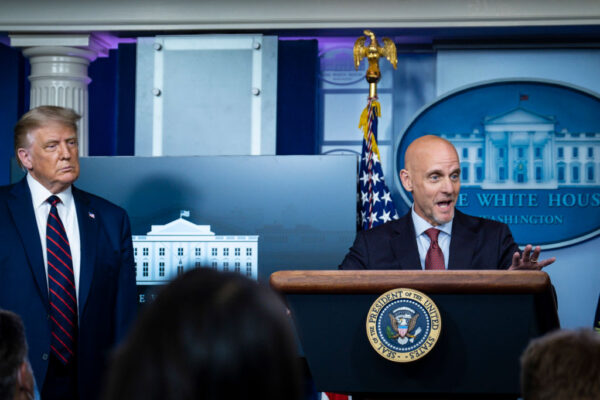
President Trump looks on while FDA Commissioner Stephen Hahn speaks during an Aug. 23 press conference.
Finding himself in a tight spot after a weekend of events that drew sharp criticism of his performance, Food and Drug Administration Commissioner Stephen Hahn took to Twitter Monday night to defend his record and offer a mea culpa for misrepresenting the benefit of a Covid-19 treatment.
On Saturday, President Donald Trump tweeted, “The deep state, or whoever, over at the FDA is making it very difficult for drug companies to get people in order to test vaccines and therapeutics. Obviously, they are hoping to delay the answer until November 3rd. Must focus on speed, and saving lives.”
But despite Trump tagging Hahn in the tweet, the defamation of 18,000 career FDA employees, whose job it is to ensure that drugs and vaccines are safe and effective before entering the market, met no criticism or pushback from the commissioner.
A day later, the agency granted, with great fanfare, an emergency use authorization for convalescent plasma as a treatment for Covid-19, calling it “another achievement in administration’s fight against pandemic” in the headline of the press release. That decision came despite an earlier move to turn down the EUA due to what federal health officials saw as insufficient robustness of the data, but there was no explanation for the reversal. Moreover, Hahn claimed erroneously that one of the main sources of data supporting the EUA, from a Mayo Clinic-sponsored expanded access protocol – not a randomized, controlled trial – posted to a preprint server, showed a 35% reduction in mortality, a gross misstatement on which the FDA nevertheless doubled down in a subsequent tweet.
Harsh criticism soon followed.
In an op-ed Monday morning, Los Angeles Times business columnist Michael Hiltzik wrote that “Thanks to Trump, the FDA just had the worst day in its history” and questioned why Hahn was still in his job. While Hahn has stated he would resign if Trump sought to approve a Covid-19 vaccine prematurely, “His kowtowing to Trump suggests he can’t be trusted to do so,” Hiltzik wrote.
STAT biotech columnist Adam Feuerstein compared Hahn’s remarks to the “nonsensical, inflated claims” he has long heard from biotech CEOs touting the benefits of their drugs.
In a series of tweets Monday night, Hahn – former chief medical executive of The University of Texas MD Anderson Cancer Center and a political novice who has served as FDA commissioner since last November – acknowledged the error, calling criticism for it “entirely justified” and clarifying that he should have said the data show a relative risk reduction rather than an absolute risk reduction. He sought to reassure the public that FDA decisions in what “happens to be a political season” will remain data-driven.
“Media coverage of FDA’s decision to issue emergency use authorization for convalescent plasma has questioned whether this was a politically motivated decision,” Hahn wrote. “The decision was made by FDA career scientists based on data submitted a few weeks ago.”
But that didn’t assuage critics.
Scripps Research Translational Institute founder Eric Topol recommended a press conference to correct the record, along with a fix to the press release’s headline, adding that such “serious mistakes” undermine his and the FDA’s credibility. Andy Slavitt, acting administrator of the Centers for Medicare and Medicaid Services under the Obama administration, called for Hahn to resign and tell “the story of interference” in order to “protect” the agency.
Photo: Pete Marovich, Getty Images










